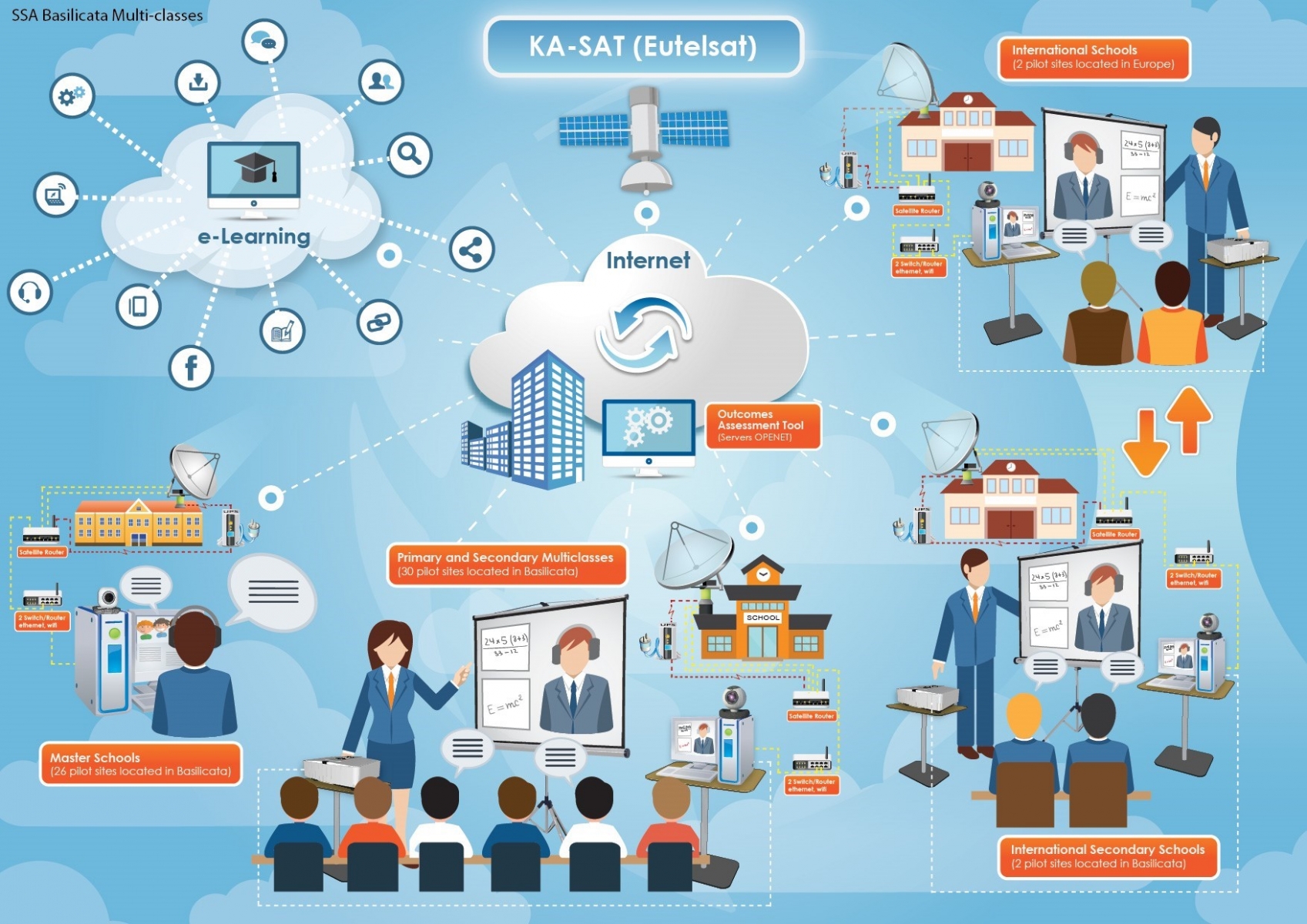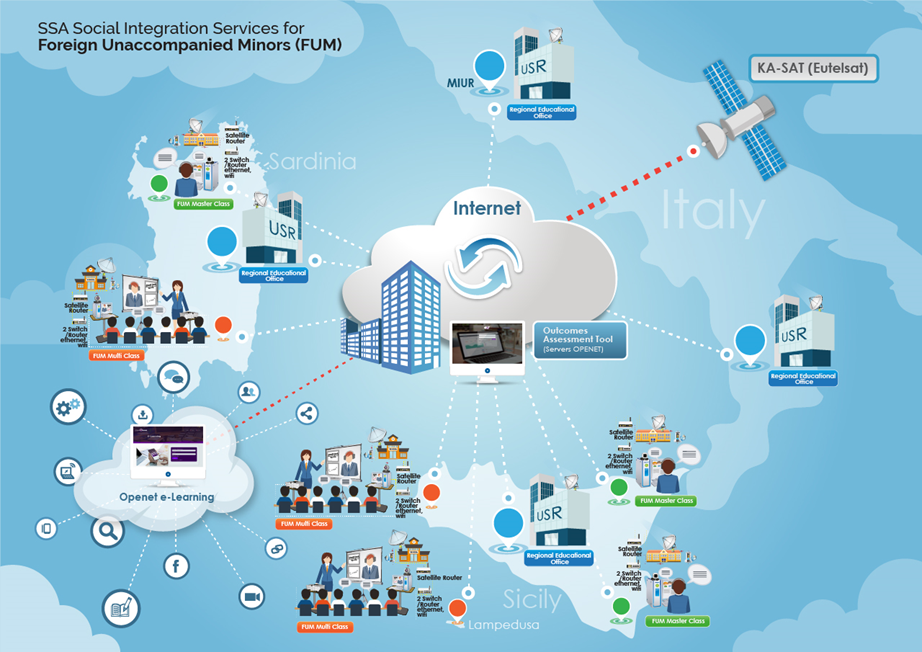
Objectives of the service
1. Basilicata Multi-classes
The project supports the Basilicata Region and the overall educational institutions needing to ensure to each student present in a multi-class the access to the complete educational programme as delivered in regular classes, where each level has a dedicated teaching team. At this aim, ONE Class! offers a satcom solution to:
- Overcome digital isolation via the satellite technology
- Overcome the limit of a multiclass via the provisioning of a new didactic model
- Innovate the educational system towards an active dimension of learning
The project wants to create “one class” virtually opened to several users and offering relevant opportunities to access to educational experiences, contents and relations wider than the ones offered by a usual physical class.
2. Social Integration Services for Foreign Unaccompanied Minors (FUM)
As for the multiclass, the project was conceived to propose an efficiently monitored satcom solution integrated with eLearning services to support social operator entities, reception centres of immigrants and other NGO’s active in the field which needed to offer to foreign unaccompanied minors (FUM) educational and social inclusion services, being often located in very remote areas.
During the project, it was not possible to perform the activities due to both issues that have affected the reception system in Italy and the changes in the priorities at the political level that have prevented the actual involvement of the reception centres.
In early 2020, the Italian Ministry of Education, University and Research (MIUR) expressed the intention to implement educational and social integration services for Foreign Unaccompanied Minors (FUM) to accelerate their language knowledge and guarantee an easier access to ordinary educational paths with special regard to isolated and remote sites. Moreover, the Ministry needs to extend the Satellite bandwidth access to n. 5 Regional Education Offices located in isolated areas to assist teachers and inform about updated guidelines in standard education procedures.
The CCN1 to the ONE Class! Project was proposed by Openet in collaboration with the MIUR.
Users and their needs
The Basilicata pilot addresses:
- Schools: Students and teachers are the “final users” of the ONE Class! solution. They need to overcome the limitations imposed by the multi-classes by accessing to a complete educational path;
- The Basilicata Region: it needs to find a new didactic model fitting the needs of the many multi-classes spread on its territory;
- Regional Education Office: it plays an important role in the process of involvement of the schools and in the design, monitoring and assessment of the education path;
- Ministry of Education: it supports the process of both digitalisation of schools and innovation in the learning/teaching practices.
With regard to the Social Integration Services for FUM, the user community is represented by both the FUM hosted in the Italian reception centres and the Regional Education Offices located in Italy. The FUM pilot addresses:
- FUM of different age and coming from different countries must share the same space/infrastructure during their stay months;
- FUM must share time and to commit it in the best way in terms of education and social inclusion activities;
- Currently, most of FUM are introduced in the Italian schools where the process of integration is not quite simple, and their schooling is not complete due to the limited stay;
- FUM also suffer from the same technology constraints as well as the Italian students; actually, most of the reception centres are in rural areas and they do not have access to internet;
- Moreover, FUM often need to use extra school time to avoid falling in idleness or in low-skilled activities;
- Access to reception centers is often subject to complicated bureaucratic procedures;
- Regional Education Office do not have the ICT infrastructure to manage remotely didactical activities;
- Regional Education Office, schools and tutors located in reception centres communicate rarely due to geographical distance with huge impacts on the didactical program.
Service/ system concept
1. Basilicata Multi-classes:
To offer students present in a multi-class the same educational path as delivered in standard schools, ONE Class! will implement a new didactic model based on:
- the daily use of video conferencing between the multi-class and the corresponding level of standard school (Synchronous teaching);
- a Cloud eLearning platform containing extra educational contents (Asynchronous teaching).
The proposed services create a clear advantage for the students thanks to access possibilities they offer to a real open network of '"Education" as well as to the possibility of creating a link between all the virtual classes. Overall, the Basilicata pilot take place for 8 months and involve a network of 28 sites, divided between multi-classes and master schools.
The Basilicata Multi-classes service system architecture is shown below:

Figure 1 – Architecture of the Basilicata Multi-classes
2. Social Integration Services for Foreign Unaccompanied Minors (FUM):
The CCN1 intends to offer a combination of educational services (synchronous and asynchronous teaching) via the use of the satellite technologies to support those stakeholders who need to socially integrate foreign unaccompanied minors (FUM) via the access to an ad-hoc educational path. The Italian Ministry of Education, University and Research expressed the following needs:
- The activation of a videocoference/eLearning platform to allow teachers and students to access on-demand to educational contents dealing with the learning and enhancing of the Italian Language (L2) and allow the creation of virtual classes;
- The development and adaptation of disciplinary contents for learning and for the enhancement of both the basic level of the Italian Language L2 (italbase) and the didactic level (italstudio) and civic and social modules that will be hosted on the eLearning platform;
- Training activities for teachers and cultural mediators needing to interact and use the eLearning Platform;
- Satellite technology and connectivity to allow FUM located in remote and isolated areas to access to the eLearning resources;
- Satellite technology and connectivity to allow Regional Education Offices located in remote areas to support local teachers and update them about education procedures and standards.

Figure 2 – Architecture for the Social Integration Services (FUM)
Space Added Value
The satellite technological solution is based on pre-existing elements already up and running provided by Eutelsat, with which Openet subscribed a specific contract. It will use the Ka–Sat system providing broadband connectivity using Ka-band frequency (20-30 GHz).
The use of satellite proves to be particularly beneficial for the targeted scenarios. The satellite technology will in fact support those schools and reception centres hosted in areas affected by digital divide and limited access to TLC.
Moreover, the standard terrestrial based IP connection cannot support the Quality of Service required for the videoconference which is necessary to support the synchronous teaching mode with the consistent level of quality. Another advantage of the satellite connection is represented by the possibility of allocating the required bandwidth on-demand, and of releasing the allocation when is not needed anymore.
Each pilot site is equipped with professional satellite terminals provisioned with satellite connectivity:
- For each pilot site, service package 30 Mbit/s download & 6 Mbit/s upload with 200GB monthly volume)
- Master class with ad hoc service 30/6 Mbps with 200 GB/monthly volume of traffic with CIR 512/512 Kbps
- Multiclass with ad hoc service 30/6 Mbps with 100 GB/monthly volume of traffic with CIR 256/256 Kbps
The use of satellite proves to be particularly beneficial for the targeted scenarios. The satellite technology will in fact support those reception centres hosted in areas affected by digital divide and limited access to TLC.
Current Status
The FAT milestone for CCN#1 has been successfully completed on the 2nd October 2020. The eLearning platform has been updated and the production of the Italian Language course for FUM has been started. Openet is starting the process of satellite installations to have the pilot network up and running for the pilot stage.



